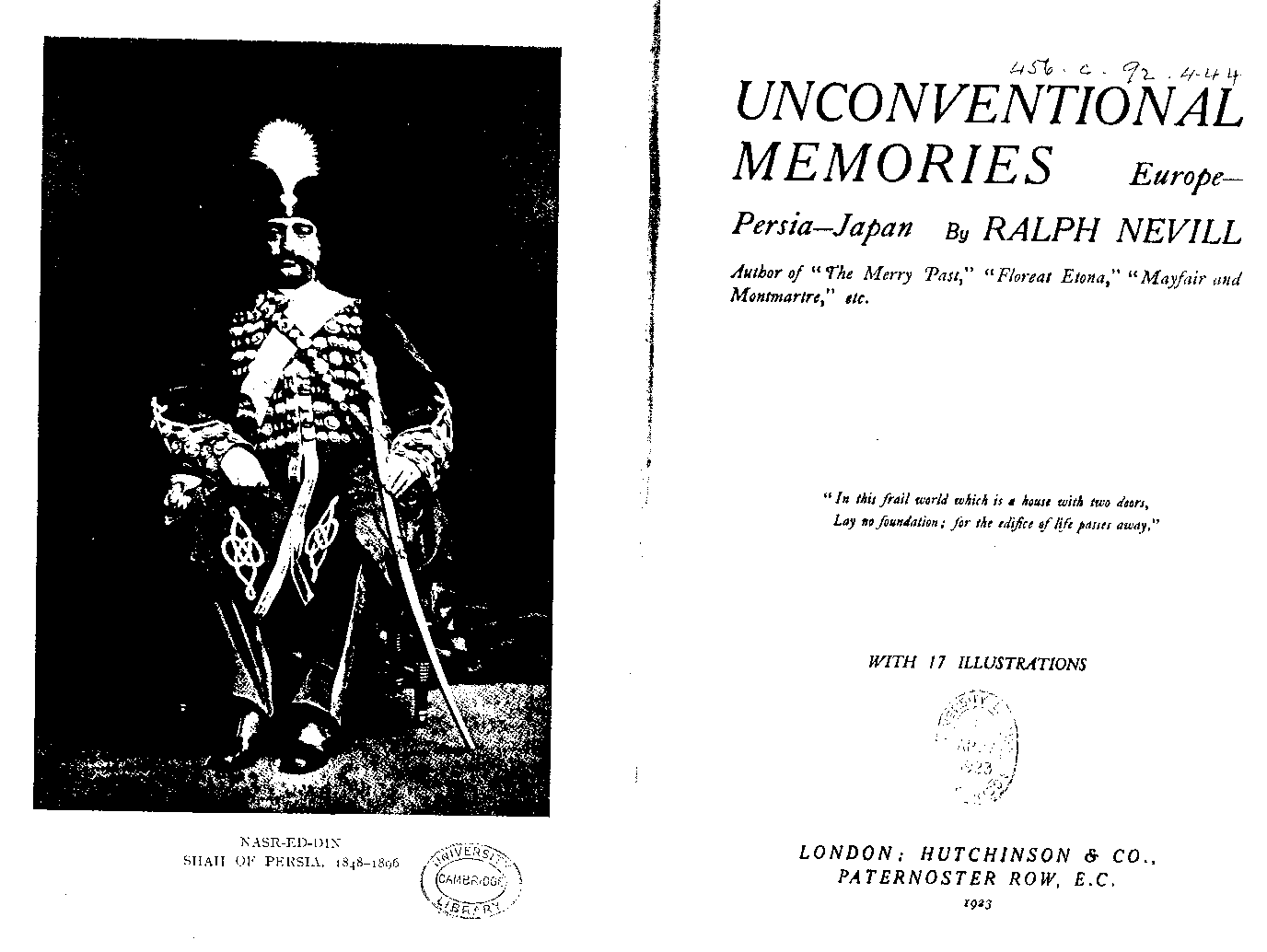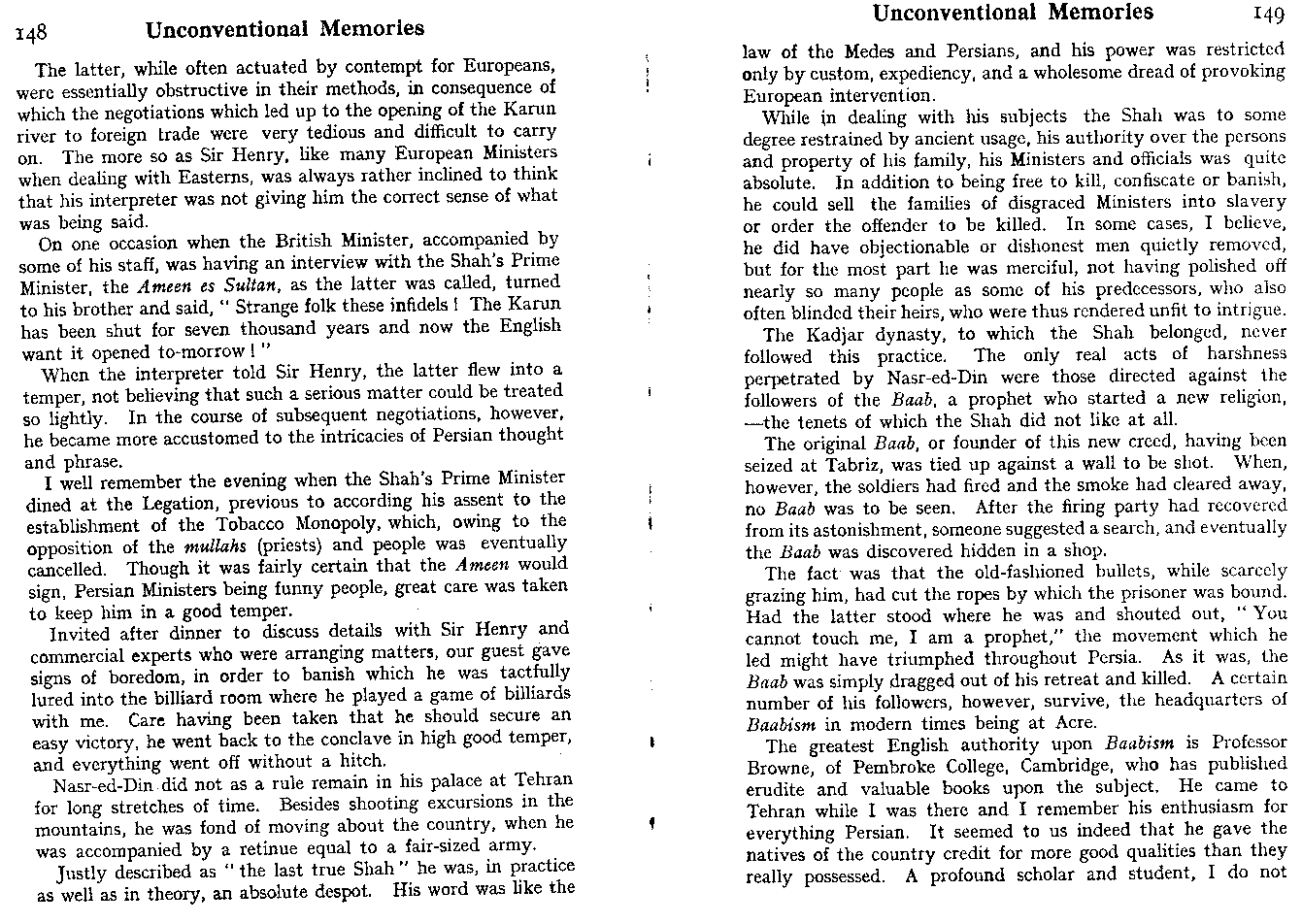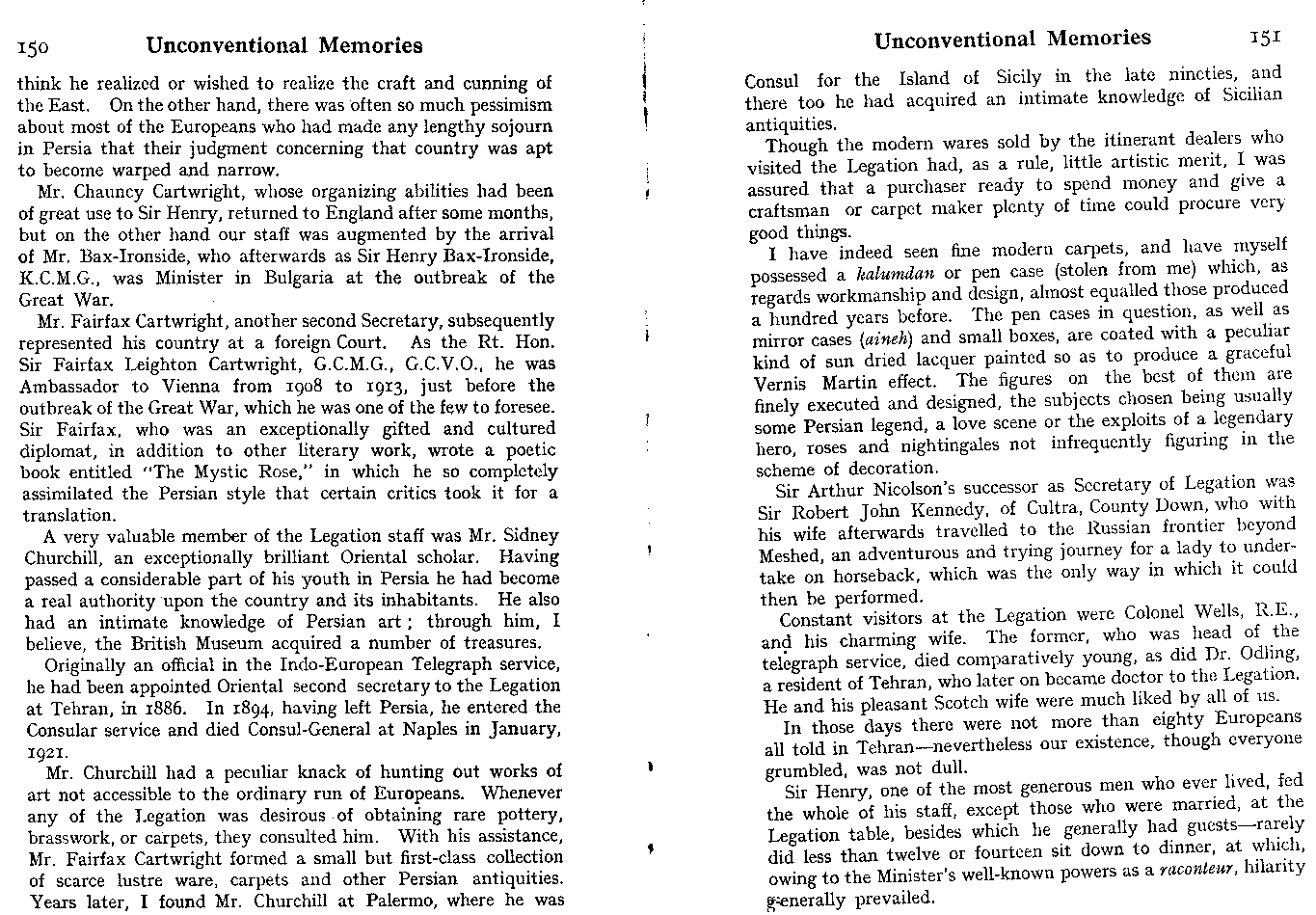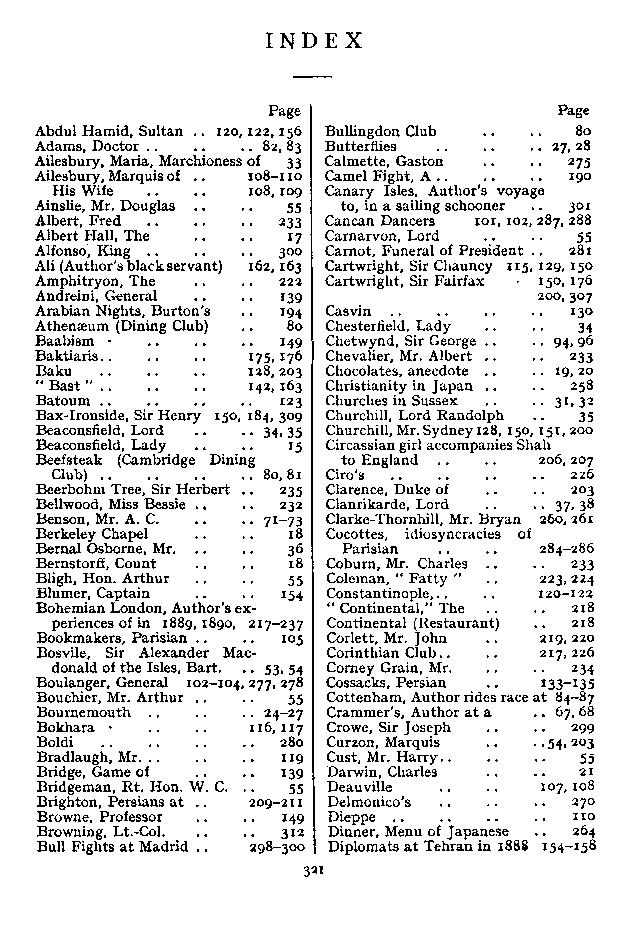
|
|
Abstract: Brief discussion of consular relations between the British and Nasiri'd-Din Shah, including his treatment of the Babis, and a mention of E. G. Browne. |
Unconventional Memories:
Europe — Persia — Japan
by Ralph Nevill
pages 148-151London: Hutchinson & Co., 1923
1. Text
[page 148]The latter, while often actuated by contempt for Europeans, were essentially obstructive in their methods, in consequence of which the negotiations which led up to the opening of the Karun river to foreign trade were very tedious and difficult to carry on. The more so as Sir Henry, like many European Ministers when dealing with Easterns, was always rather inclined to think that his interpreter was not giving him the correct sense of what was being said.
On one occasion when the British Minister, accompanied by some of his staff, was having an interview with the Shah's Prime Minister, the Ameen es Sultan, as the latter was called, turned to his brother and said, "Strange folk these infidels! The Karun has been shut for seven thousand years and now the English want it opened to-morrow!"
When the interpreter told Sir Henry, the latter flew into a temper, not believing that such a serious matter could be treated so lightly. In the course of subsequent negotiations, however, he became more accustomed to the intricacies of Persian thought and phrase.
I well remember the evening when the Shah's Prime Minister dined at the Legation, previous to according his assent to the establishment of the Tobacco Monopoly, which, owing to the opposition of the mullahs (priests) and people was eventually cancelled. Though it was fairly certain that the Ameen would sign, Persian Ministers being funny people, great care was taken to keep him in a good temper.
Invited after dinner to discuss details with Sir Henry and commercial experts who were arranging matters, our guest gave signs of boredom, in order to banish which he was tactfully lured into the billiard room where he played a game of billiards with me. Care having been taken that he should secure an easy victory, he went back to the conclave in high good temper, and everything went off without a hitch.
Nasr-ed-Din did not as a rule remain in his palace at Tehran for long stretches of time. Besides shooting excursions in the mountains, he was fond of moving about the country, when he was accompanied by a retinue equal to a fair-sized army.
Justly described as "the last true Shah" he was, in practice as well as in theory, an absolute despot. His word was like the
[page 149]
law of the Medes and Persians, and his power was restricted only by custom, expediency, and a wholesome dread of provoking European intervention.
While in dealing with his subjects the Shah was to some degree restrained by ancient usage, his authority over the persons and property of his family, his Ministers and officials was quite absolute. In addition to being free to kill, confiscate or banish, he could sell the families of disgraced Ministers into slavery or order the offender to be killed. In some cases, I believe, he did have objectionable or dishonest men quietly removed, but for the most part he was merciful, not having polished off nearly so many people as some of his predecessors, who also often blinded their heirs, who were thus rendered unfit to intrigue.
The Kadjar dynasty, to which the Shah belonged, never followed this practice. The only real acts of harshness perpetrated by Nasr-ed-Din were those directed against the followers of the Baab, a prophet who started a new religion — the tenets of which the Shah did not like at all.
The original Baab, or founder of this new creed, having been seized at Tabriz, was tied up against a wall to be shot. When, however, the soldiers had fired and the smoke had cleared away, no Baab was to be seen. After the firing party had recovered from its astonishment, someone suggested a search, and eventually the Baab was discovered hidden in a shop.
The fact was that the old-fashioned bullets, while scarcely grazing him, had cut the ropes by which the prisoner was bound. Had the latter stood where he was and shouted out, "You cannot touch me, I am a prophet," the movement which he led might have triumphed throughout Persia. As it was, the Baab was simply dragged out of his retreat and killed. A certain number of his followers, however, survive, the headquarters of Baabism in modern times being at Acre.
The greatest English authority upon Baabism is Professor Browne, of Pembroke College, Cambridge, who has published erudite and valuable books upon the subject. He came to Tehran while I was there and I remember his enthusiasm for everything Persian. It seemed to us indeed that he gave the natives of the country credit for more good qualities than they really possessed. A profound scholar and student, I do not
[page 150]
think he realized or wished to realize the craft and cunning of the East. On the other hand, there was often so much pessimism about most of the Europeans who had made any lengthy sojourn in Persia that their judgment concerning that country was apt to become warped and narrow.
Mr. Chauncy Cartwright, whose organizing abilities had been of great use to Sir Henry, returned to England after some months, but on the other hand our staff was augmented by the arrival of Mr. Bax-Ironside, who afterwards as Sir Henry Bax-Ironside, K.C.M.G., was Minister in Bulgaria at the outbreak of the Great War.
Mr. Fairfax Cartwright, another second Secretary, subsequently represented his country at a foreign Court. As the Rt. Hon. Sir Fairfax Leighton Cartwright, G.C.M.G., G.C.V.O., he was Ambassador to Vienna from 1908 to 1913, just before the outbreak of the Great War, which he was one of the few to foresee. Sir Fairfax, who was an exceptionally gifted and cultured diplomat, in addition to other literary work, wrote a poetic book entitled "The Mystic Rose," in which he so completely assimilated the Persian style that certain critics took it for a translation.
A very valuable member of the Legation staff was Mr. Sidney Churchill, an exceptionally brilliant Oriental scholar. Having passed a considerable part of his youth in Persia he had become a real authority upon the country and its inhabitants. He also had an intimate knowledge of Persian art; through him, I believe, the British Museum acquired a number of treasures.
Originally an official in the Indo-European Telegraph service, he had been appointed Oriental second secretary to the Legation at Tehran, in 1886. In 1894, having left Persia, he entered the Consular service and died Consul-General at Naples in January, 1921.
Mr. Churchill had a peculiar knack of hunting out works of art not accessible to the ordinary run of Europeans. Whenever any of the Legation was desirous of obtaining rare pottery, brasswork, or carpets, they consulted him. With his assistance, Mr. Fairfax Cartwright formed a small but first-class collection of scarce lustre ware, carpets and other Persian antiquities. Years later, I found Mr. Churchill at Palermo, where he was
[page 151]
Consul for the Island of Sicily in the late nineties, and there too he had acquired an intimate knowledge of Sicilian antiquities.
Though the modern wares sold by the itinerant dealers who visited the Legation had, as a rule, little artistic merit, I was assured that a purchaser ready to spend money and give a craftsman or carpet maker plenty of time could procure very good things.
I have indeed seen fine modern carpets, and have myself possessed a kalumdan or pen case (stolen from me) which, as regards workmanship and design, almost equalled those produced a hundred years before. The pen cases in question, as well as mirror cases (aineh) and small boxes, are coated with a peculiar kind of sun dried lacquer painted so as to produce a graceful Vernis Martin effect. The figures on the best of them are finely executed and designed, the subjects chosen being usually some Persian legend, a love scene or the exploits of a legendary hero, roses and nightingales not infrequently figuring in the scheme of decoration.
Sir Arthur Nicolson's successor as Secretary of Legation was Sir Robert John Kennedy, of Cultra, County Down, who with his wife afterwards travelled to the Russian frontier beyond Meshed, an adventurous and trying journey for a lady to undertake on horseback, which was the only way in which it could then be performed.
Constant visitors at the Legation were Colonel Wells, R.E., and his charming wife. The former, who was head of the telegraph service, died comparatively young, as did Dr. Odling, a resident of Tehran, who later on became doctor to the Legation. He and his pleasant Scotch wife were much liked by all of us.
In those days there were not more than eighty Europeans all told in Tehran — nevertheless our existence, though everyone grumbled, was not dull.
Sir Henry, one of the most generous men who ever lived, fed the whole of his staff, except those who were married, at the Legation table, besides which he generally had guests — rarely did less than twelve or fourteen sit down to dinner, at which, owing to the Minister's well-known powers as a raconteur, hilarity generally prevailed.
2. Image scans (click image for larger version)

|
|


